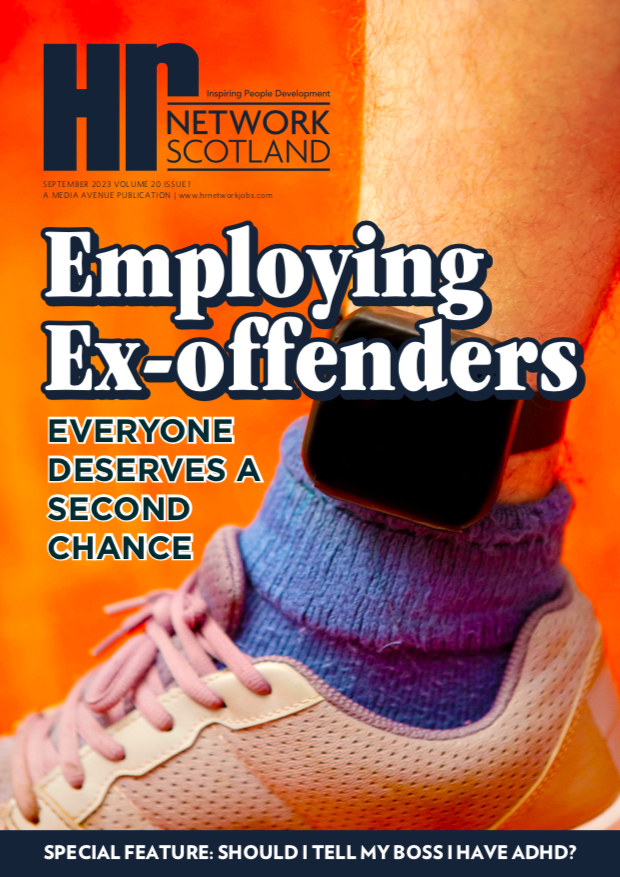Our Latest News
Menopause Awareness Month: UK leads the way in offering menopause policies
Menopause Awareness Month: UK leads the way in offering menopause policies
 As we enter Menopause Awareness Month for October, feel-good PR agency Lem-uhn, has revealed that there has been a 51% increase in searches for ‘menopause policy’ in the UK in the last year. The rise in searches is illustrative of menopausal employees seeking additional support, as well as shifting attitudes in the workplace.
As we enter Menopause Awareness Month for October, feel-good PR agency Lem-uhn, has revealed that there has been a 51% increase in searches for ‘menopause policy’ in the UK in the last year. The rise in searches is illustrative of menopausal employees seeking additional support, as well as shifting attitudes in the workplace.
The data, compiled by Lem-uhn using Google Trends, found that there was a noticeable uptake in UK searches for ‘menopause policy’ shortly after Davina McCall’s book Menopausing was published in September 2022. Lem-uhn also identified another spike in March 2023 when the UK government appointed its first Menopause Employment Champion in an effort to improve workplace support for menopausal employees. This comes after a UK survey conducted in 2019 showed that 90% of women reported that their workplace did not offer support for menopause, with only 5% mentioning that their employer offered advice.
This lack of support is likely driving the increase in searches, as people seek out information and resources on how to manage menopause at their places of employment. On the other hand, companies are also increasingly aware of the need to revise their policies to best support menopausal employees, as they recognise the benefits of creating a more inclusive and supportive workplace for all.
The top countries searching for ‘menopause and work’:
| Rank | The top countries searching for ’menopause and work’ |
| 1 | United Kingdom |
| 2 | Ireland |
| 3 | South Africa |
| 4 | United States |
| 5 | Canada |
| 6 | Australia |
| 7 | India |
Lem-uhn also unveils that the UK is the number one country searching for “menopause and work”, with searches for these terms 31% more popular than in Ireland, and 69% higher than in South Africa, the second and third most popular countries on the list.
In line with shifting attitudes in the workplace, Lem-uhn announced its Menstrual Policy allowing employees up to ten days’ leave for debilitating periods and menopause symptoms and following pregnancy loss.
Riannon Palmer, founder and managing director of Lem-uhn, said: “Menopause currently is or will in the future affect half of the world. Workplaces must provide better support to ensure that talented women are able to remain in the workplace. We hope that policies like ours will make life easier for women and be part of the change to normalise the conversation about a natural and inevitable part of life for half of the population.”
40% of women state care responsibilities impact their tech career choices
40% of women state care responsibilities impact their tech career choices
40 per cent of women in the technology sector agree that their decision to stay in their current role depends on the care responsibilities they have, according to the Tech Talent Charter. The research shows that almost 12 per cent of women have left their role in technology so they can invest more time in their caring commitments, while a lack of work-life balance was also shown to be the top reason for women deciding to leave their role in the technology industry.

While disproportionate care responsibilities were evident before the pandemic, it is said that the work-from-home mandate has highlighted that women have been hit with even more care responsibilities, making it no surprise that those who are able to work more flexibility have higher retention rates.
Along with care responsibilities, a lack of career development was also highlighted as a key reason for women leaving their roles in tech, with four out of five women saying this has impacted their decision, while pay dissatisfaction was also shown to be a top reason, likely being linked to the cost of living crisis and high childcare costs.
Joanna Kori, Head of People at Encompass Corporation, commented: “It is both concerning and disheartening to see these figures, which highlight women being forced to alter or give up their careers in technology – and especially when a primary cause is centred on a lack of flexible working practices.
“With women saying they have left roles to better fulfil care commitments, this only emphasises, again, the importance of giving employees the opportunity to make work work for them. These commitments should not be a barrier and flexible working policies, for example, can be central to empowering women, and all workers, to prioritise the life and wellbeing choices that are important to them while meeting professional goals.
“Organisations should regularly evaluate whether their existing workplace policies match the needs of their employees, and evolve them as necessary to ensure all staff are well supported. Despite progress, the number of women in the technology sector is still too low. Unless we see tangible action and commitment to change, this will only continue, with talent and potential remaining untapped.”
Karen Blake, Tech Talent Charter’s chief operating officer, said: “It’s really troubling to learn about the high number of women in tech who are feeling unhappy in their jobs. It’s especially discouraging to see that so many talented female technologists are considering leaving their positions or not staying for very long.”
Student Loans Company appoints new People Director
Student Loans Company appoints new People Director
The Students Loans Company (SLC) has appointed Gillian Brydie as Executive Director, People. Following more than 20 years in the financial services sector, Gillian moves into the public sector bringing a wealth of experience to the organisation, including expertise in strategy development, people change and transformation, business partnering and senior leadership. Leading the People Directorate, she is responsible for developing the People Strategy, which aims to ensure that SLC is a great place to work.
 Gillian joins from NatWest where she was the Head of People Transformation. Chris Larmer, CEO at SLC, said: “I am thrilled to welcome Gillian to SLC to lead our People Directorate. We are a customer-focussed, purpose driven business and our employees are at the heart of everything we do. Gillian has extensive skills and experience that will be of huge benefit as we move forward and continue to make SLC a great place to work.
Gillian joins from NatWest where she was the Head of People Transformation. Chris Larmer, CEO at SLC, said: “I am thrilled to welcome Gillian to SLC to lead our People Directorate. We are a customer-focussed, purpose driven business and our employees are at the heart of everything we do. Gillian has extensive skills and experience that will be of huge benefit as we move forward and continue to make SLC a great place to work.
“Gillian has a proven track record of leading large teams and focusing on the success of strategic priorities. We are excited to have her on board at SLC.”
Gilian has a BSc (hons) in Physiological Sciences from the University of Newcastle Upon Tyne and is a member of the Chartered Institute of Bankers in Scotland. She joined Natwest in 2005 and was previously at HBOS.
Speaking about her appointment, Gillian said: “I have been looking forward to joining SLC – my first public sector role after a career in financial services. This is an excellent opportunity to lead a team who are committed and passionate about the people in this organisation and continue to develop our culture.
“SLC’s purpose plays a core role in enabling students to realise their ambitions and supporting their education journey. In my first few weeks, I have been encouraged by the extensive knowledge and experience in the business, both in the People team and beyond in other directorates. There’s lots to do and I’m excited to get started.”
Employers encouraged to remove barriers to seeking mental health at work
Employers encouraged to remove barriers to seeking mental health at work
EMPLOYERS across Scotland are being encouraged to take action on employee wellbeing, and address the factors that are preventing employees from speaking up and seeking support when they need it. See Me, Scotland’s programme to end mental health stigma and discrimination, is calling on senior leaders to show a commitment to improving workplace mental health, invest time and effort into improving their practice, and role model non-stigmatising attitudes and behaviours.
Despite progress in recent years in terms of public awareness of mental health, stigma – negative attitudes or beliefs based on a preconception, misunderstanding or fear of mental health – and fear of discrimination continue to hold workers back from speaking up when they’re struggling in the workplace.
 The Scottish Mental Illness Stigma Study, published in 2022 by See Me and the Mental Health Foundation, found that more than three quarters (77%) of people with experience of severe, enduring and complex mental illness have faced stigma at work. Of those who identified employment as an area where stigma had the greatest impact, 71% reported being treated unfairly by employers, supervisors or managers.
The Scottish Mental Illness Stigma Study, published in 2022 by See Me and the Mental Health Foundation, found that more than three quarters (77%) of people with experience of severe, enduring and complex mental illness have faced stigma at work. Of those who identified employment as an area where stigma had the greatest impact, 71% reported being treated unfairly by employers, supervisors or managers.
To help businesses take action against stigma, and recognise where they can do more to support staff wellbeing, See Me’s workplace team will host a series of webinars and masterclasses in the months ahead. The free online sessions will showcase how taking action to tackle mental health stigma at work can benefit businesses – by saving money, reducing absenteeism and presenteeism, and creating a better working environment for staff.
Employers across Scotland are seeing the benefit of engaging with See Me to take action against mental health stigma, including ScottishPower. Vicky Philips, Occupational Health, Hygiene and Wellbeing Director at ScottishPower, said: “Employee wellbeing is hugely important to ScottishPower, and mental wellbeing is a key component of that. Our partnership with See Me has been really influential as part of our journey to improve attitudes and awareness surrounding mental health in the workplace. They’ve worked with us every step of the way and provided independent expert guidance to help keep us on track. We look forward to continuing our partnership with See Me for the rest of our journey, however long it takes.”
The upcoming sessions will cover a range of topics, including understanding mental health at work, the role of managers in supporting staff mental health, and how to have conversations to reduce work-related stress. Attendees will also get the chance to find out more about the type of support See Me has to offer workplaces, and the free resources on offer to help you take action against stigma as part of the wider See Us movement.
Dr Patty Lozano-Casal, programme manager at See Me, said: “It is estimated that mental health problems currently cost employers in Scotland £2 billion annually, between sick leave and recruitment when staff are no longer able to stay in their role. Mental health stigma and discrimination in the workplace often comes from a lack of knowledge. It can damage employees’ confidence, limit their potential and prolong an illness. All of this harms the employer as well as the individual. Speaking to your employees about their mental health and creating a culture where people can talk openly will not only get the best out of people, but the different insights people can give can actually help achieve organisational goals.
Patty added: “Our series of free online events offer an ideal opportunity for line managers, HR professionals and company leaders to find out more about different aspects which can improve wellbeing at work, while removing some of the barriers which are stopping people from speaking up about how they are feeling.”
Narcissistic leaders cause employees undue stress in crisis situations
Narcissistic leaders cause employees undue stress in crisis situations

Vulnerable narcissistic leaders are especially likely to make employees irritated during crisis situations, reveals new research from NEOMA Business School.Birgit Schyns, Distinguished Professor of People & Organisations at NEOMA, and co-authors analysed survey data on workers in the UK education sector during the COVID-19 pandemic.
Respondents reported their levels of irritation and Coronavirus-related worry in five weekly surveys, as well as their experiences with vulnerable narcissistic leadership – an unstable form of leadership characterised by covert feelings of entitlement.
The study finds that employees subjected to this kind of behaviour reported feeling more irritation in general, and this irritation worsened in weeks when they were exposed to higher amounts of vulnerable narcissistic behaviour from those in charge.
“Resources are often already stretched thin in crisis situations. Vulnerable narcissistic leaders strain them further, for instance by giving employees no guidelines on how to accomplish goals or blaming others for their own shortcomings. Employees already short on time and energy are required to invest more in making sense of their leader’s behaviour,” explains Professor Schyns.
The researchers suggest organisations should watch out for red flags of narcissistic leadership, such as punishing others for taking the initiative, as the irritation this causes followers can lead to more severe mental health impairments.
“Followers can be protected by implementing checks and balances and adjusting HR practices to better deal with these behaviours,” says Professor Schyns.
OUT TODAY – SEPTEMBER 2023 Issue of Hr NETWORK Magazine
OUT TODAY – SEPTEMBER 2023 Issue of Hr NETWORK Magazine
Hr NETWORK is ‘The Hub’ of Scottish HR and people development with an ‘Access All Areas’ pass to Scotland’s most influential human resource and business professionals across all sectors in Scotland. As well as readers from the world of HR, the magazine is also extremely popular within SME (Small and Medium Enterprise) organisations and is very useful for line managers, heads of department, senior management, managing directors and other professionals throughout the country who play a vital role in the development of people within all industry sectors in Scotland. Published bi-monthly, Hr NETWORK Magazine is informative and a ‘must have’ for its readers, and brings with it in every issue, great opportunities and benefits for advertisers and sponsors too.
Hr NETWORK Magazine September 2023
Employing Ex-offenders: Everyone deserves a second chance
More ex-offenders and those nearing the end of their prison term are being given the chance to re-enter or enter employment. Many HR practitioners consider this a welcome opportunity to both address their talent shortages and improve diversity. But are there risks? Andy Moore finds out.
Also in the latest issue:
- The regular sections of the magazine include: Stats, EXTRA and The Bookshop
- The ‘Insights’ section features first class comment from those in the know on a range of subjects including: Pets in the Workplace; Always On; Sustainability; Bullying & Harassment








